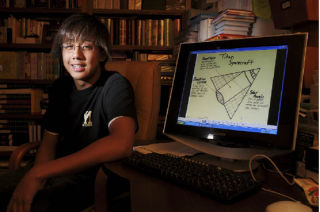Mercer Island High School juniors Michael Rudokas and Alex Tao are preparing a mission to Mars. After proving themselves in “Phase One” of the 2008 Washington Aerospace Scholar (WAS) program, the two teenagers have qualified for a summer residency at the Museum of Flight, where they will design a human mission to Mars with experts in the field.
Their theoretical adventure into space began six months ago when the two Islanders were selected as 2008 WAS scholars, along with 223 juniors across the state. The interactive, Web-based program, organized by NASA and the Museum of Flight, challenged the competing students with an online course that included mathematical problem solving, graphic design, essays and weekly tests.
Eager to qualify for “Phase Two” of the program, a week-long residency at the Museum of Flight, Rudokas and Tao spent much of their second semester puzzling over space theory and math equations online.
“I actually enjoy it because it’s something I chose to do,” Rudokas told the Reporter earlier this year. “These assignments are really fun because you use your creativity and the computer to design space equipment.”
The WAS material covered the history of space exploration such as Lunar and Martian explorations, and included links to virtual reality models, interactive tutorials and 3-D graphics while letting students speak with experts in the field. The distance-learning curriculum also required students to write a final essay on the history of space exploration with illustrative graphics.
Based on the overall quality of their work and test scores, 160 scholars — Rudokas and Tao among them — qualified for Phase Two: a week-long residency at the Washington Museum of Flight.
Asked how it felt to make the cut, Rudokas said he was thrilled.
“I was extremely excited,” he said, adding that he looks forward to the challenge ahead. “Because all the winners had to work through so much, I know that they’ll be really motivated and smart. A lot of good ideas will be going around, which will make the week all the more better.”
Phase One of the project, which took place from January through May, was no easy feat. Saddled with school work, SATs and extra-curricular obligations, Rudokas’ parents encouraged him to keep a level head about the WAS competition. Even so, the MIHS junior managed to keep his online space studies a priority.
“It was a lot of work, but I knew that as long as I kept my grades up, I could probably make it,” he said.
Tao was also devoted to finishing every WAS assignment on time and professionally.
“I was impressed by how easily he balanced the WAS project with his homework and swimming,” said Lillian Tao, of her son, who competes on the MIHS varsity swim team.
As did Rudokas, Tao said he actually enjoyed the course work.
“I’ve learned a lot. Even if I didn’t make it to Phase Two, I wouldn’t regret doing the homework they assigned,” he said, adding that the material on Mars particularly interested him.
This summer will mark the second year when the Museum of Flight has hosted the WAS competition, which is based on a decades-old program held in Houston, Texas, at the Johnson Space Center.
According to Rosie Bailer, executive director of WAS, the competition was designed to inspire students toward a career in science, technology, engineering or mathematics.
“There are so many different pathways for them to get into these fields, so we’re trying to show them as wide a range as possible,” she said, adding that Phase Two is as much a celebration as a challenge. “It’s a really good opportunity to reward them for having those wonderful big brains that they have.”
In the afternoons, the scholars will listen to briefings from experts in the field. Afterward, they will compete in hands-on engineering challenges, such as building model rockets and space stations. The students will also take field trips to local facilities such as the Boeing Plant in Everett and the University of Washington’s College of Engineering.
“It’s a theoretical mission,” Bailer explained. “The scholars work with engineering professionals and scientists who come in as mentors.”
Islander Erik Wallin is one of these mentors. A first-grade teacher at Lakeridge Elementary school, Wallin joined the program to engage in his love for science and teaching.
“The thing I enjoy most is seeing the kids learn on the spot,” said the WAS associate, who worked at the museum last summer.
From June 22 through June 27, all three Islanders will challenge themselves with questions about the universe. They will get a taste of life as an engineer, a career in astronautics, and pushing their parameters of creativity. It will be an enriching experience. And it will be a lot of fun.



